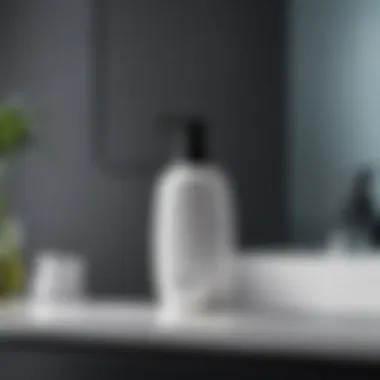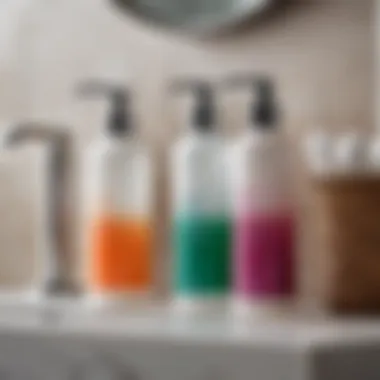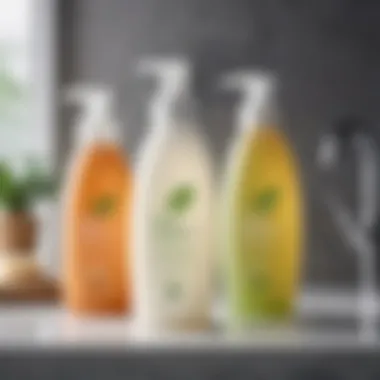Exploring the Functional Appeal of Shampoo Dispenser Bottles


Intro
In contemporary domestic and commercial environments, the shampoo dispenser bottle has emerged as a practical solution for efficiently dispensing hair care products. These bottles are designed with user convenience and functionality in mind, addressing common issues related to traditional shampoo containers. They reduce waste, streamline the application of products, and offer a level of consistency unmatched by one-time-use packages. Despite their simplicity, the attention to detail in design, material selection, and ergonomics warrants deeper exploration.
The transition to shampoo dispenser bottles is influenced by several factors, including their aesthetic appeal and functional advantages. Homeowners appreciate their sleek appearance, while businesses value the operational efficiencies they bring to retail settings. Furthermore, as environmental concerns rise, many consumers seek products that promote sustainability. This article will delve into these considerations, offering a thorough look at shampoo dispenser bottles and highlighting features that make them essential in today’s societal context.
Foreword to Shampoo Dispenser Bottles
In today's world, where convenience and efficiency play crucial roles in daily routines, shampoo dispenser bottles have become essential items in both households and commercial settings. These bottles serve a clear purpose by providing a practical way to store and dispense liquid products like shampoo. The growing emphasis on user experience and efficient usage has led to a deeper exploration of these dispensers.
Benefits of using shampoo dispensers include minimizing waste, enhancing hygiene, and offering ease of use. Understanding their fundamental characteristics reveals how they have been embraced widely. This article seeks to illuminate these features, which are significant not only for consumers but also for businesses aiming to optimize their operations.
Considerations around shampoo dispensers encompass factors such as design, material, and functionality. Each of these aspects plays an impactful role in determining the right choice for different environments and user preferences. At the core, a shampoo dispenser bottle is more than just a container; it's a solution for effective and sustainable cleaning routines.
Definition and Purpose
Shampoo dispenser bottles are designed to store and dispense shampoo efficiently. Their primary purpose is to facilitate the easy and controlled release of the product without wasting it. In contrast to standard bottles, these dispensers incorporate mechanisms that allow for single-handed operation, enhancing the user experience. The purpose extends beyond mere convenience; it aims to reduce environmental impact by decreasing the likelihood of overuse or spillage.
Historical Context
The development of shampoo dispensers corresponds with wider trends in consumer products. Initially, shampoo was sold in basic containers that posed various challenges, such as difficulty in controlling the amount dispensed. As awareness of hygiene increased, manufacturers began to design dispenser bottles that not only served a functional role but also appealed aesthetically. Over the decades, shifts toward sustainable materials have also influenced the evolution of these dispensers. Now, shampoo dispenser bottles can be found in multiple forms, emphasizing efficiency, user-friendly design, and eco-conscious attributes.
Design Elements of Dispensers
The design elements of shampoo dispenser bottles play a critical role in both their functionality and aesthetic appeal. A well-designed dispenser is not just a container; it enhances the user experience while fulfilling practical needs. Various factors come into play when evaluating the design of these dispensers, from the materials used to the stylistic choices that cater to diverse consumer preferences. Understanding these elements can help users select a dispenser that meets their requirements, while also contributing positively to their environment.
Material Choices
Plastic vs Glass
The choice between plastic and glass is essential when selecting a shampoo dispenser. Plastic is lightweight and shatterproof, making it an appealing choice for households with children or those who prefer a portable option. Additionally, plastic dispensers are often more affordable, offering a budget-friendly solution for families looking for functionality without compromising on design.
In contrast, glass provides a more premium feel. It is often regarded as more elegant, and can add a touch of sophistication to bathrooms or spa-like environments. Glass also has the advantage of being non-porous, which can help maintain the freshness of the shampoo inside, although it is less practical in terms of weight.
Each material presents its advantages and disadvantages. While plastic is practical and economical, glass appeals to those who prioritize aesthetics and durability.
Recycled Materials
Utilizing recycled materials in shampoo dispensers is an environmentally conscious choice. Dispensers made from recycled plastics not only reduce waste but also conserve resources. The key characteristic here is sustainability, as many consumers are increasingly aware of the impact of their choices on the environment.
Recycled materials can come from various sources, including post-consumer plastic waste. This approach promotes a circular economy, as these products often have a lower carbon footprint compared to new plastic. However, it is important to consider the trade-off, as not all recycled materials may ensure the same high quality as their virgin counterparts.
Styles and Aesthetics


Minimalist Designs
Minimalism in design is often characterized by simplicity and functionality. Minimalist designs for shampoo dispensers remove unnecessary embellishments, focusing on clean lines and an uncluttered appearance. This approach aligns well with modern aesthetics, appealing to consumers who value simplicity and efficiency.
Such designs are beneficial as they can easily blend into various environments, from sleek urban apartments to tranquil spa spaces. Streamlined forms can also make it easier to clean and maintain, which is practical for everyday use. Nonetheless, it is crucial to ensure that minimalist designs do not compromise user-friendliness, as complicated mechanisms can deter some users.
Color Variations
Color variations in shampoo dispensers allow for personal expression and can significantly influence consumer choice. Bright colors can provide a playful element, making them attractive for families with children. More subdued tones, like pastels or earthy shades, often find favor among adults seeking a calming atmosphere in their bathrooms.
This element also encourages customization, enabling customers to choose dispensers that match their personal style or interior décor. While color can enhance visual appeal, it is worth noting that it can also impact perceptions of cleanliness. Darker colors may obscure residue or buildup, while lighter tones may require more frequent cleaning.
In summary, the design elements of shampoo dispensers encompass various factors, including material choices and aesthetic styles. By understanding these elements, consumers can make informed decisions that suit their practical needs and personal tastes.
Functionality and Practicality
In any discussion surrounding shampoo dispenser bottles, the aspects of functionality and practicality take center stage. These elements define how effectively a dispenser works in daily use, whether at home or in a commercial setting. The design is not just for aesthetics; it serves a critical purpose in enhancing user experience and streamlining routines. Functionality often correlates with convenience, ensuring that consumers can efficiently dispense their shampoo without excessive hassle. Practicality, on the other hand, encompasses how useful the dispenser is in handling everyday demands.
Ease of Use
Single-Hand Operation
The concept of single-hand operation in shampoo dispenser bottles has grown increasingly popular. This feature allows users to easily dispense shampoo with one hand, freeing up the other for multitasking, such as holding the bottle or managing hair. The key characteristic here is the simplicity of dispensing. It means that a user can maintain a comfortable grip and avoid accidental spills, thus increasing efficiency in the shower or bath. A unique advantage of this design is that it gives users better control, especially when shampoo is needed quickly. However, one must consider that if the pump mechanism is not well-designed, it could lead to frustration over time.
Control of Dispensing Amount
Control of dispensing amount is another critical aspect to consider. A well-designed dispenser allows users to regulate how much shampoo they dispense per pump. This characteristic is beneficial as it minimizes waste, which is especially relevant in both domestic and commercial contexts. Users appreciate dispensers that offer precision, allowing them to obtain just the right amount of product needed for optimal cleaning without excess. One unique feature of many modern dispensers is the adjustable nozzle, which can offer varied dispensing sizes. However, it is important to note that less intuitive designs can complicate the dispensing process and lead to confusion.
Hygiene Benefits
Reduced Contamination
Reduced contamination is a major theme in the hygiene benefits of shampoo dispenser bottles. Unlike traditional shampoo containers, which often require lifting and opening, dispensers can mitigate exposure to external contaminants. The sealed design means that users can avoid direct contact with the product, allowing for a cleaner application. A key aspect of this feature is reducing the spread of germs, which is increasingly vital in today’s health-conscious society. A unique advantage of this type of system is that it can lead to a more sanitary bathroom environment. However, if the dispensing mechanism itself is not cleaned regularly, it may paradoxically introduce contaminants.
Self-Sealing Dispensers
Self-sealing dispensers further enhance hygiene by ensuring that the product remains sealed until needed. This design prevents any unintentional spillage and reduces the chance of contamination through environmental exposure. The characteristic of self-sealing is appealing as it provides an extra layer of protection and hygiene. Features like spring-loaded or push-button seals ensure that the product is only available during the dispensing action. One potential downside is that if the sealing mechanism fails, it can lead to product wastage and spoilage more quickly.
Dispensers for Commercial Use
Salons and Spas
In commercial settings, such as salons and spas, shampoo dispenser bottles serve an essential practical role. They are favored for their ability to provide uniform dispensing and enhance customer service. A significant benefit is that staff can efficiently use both hands while serving clients, maintaining a fluid workflow. Unique features like wall-mounted dispensers can also save space, a crucial consideration in busy work environments. However, it is also vital to ensure that the dispensers used are attractive and functional, as they reflect the business’s branding and quality.
Hotels and Hospitality


In the hospitality industry, shampoo dispensers are increasingly adopted for both economic and environmental reasons. These dispensers offer a sustainable solution to single-use shampoo bottles, aligning with a growing consumer preference for eco-friendly options. A key characteristic of this approach is cost-effectiveness; purchasing bulk shampoo can significantly reduce expense. Additionally, providing high-quality dispensers can enhance the guest experience. A unique aspect of hotel dispensers is that they can be refilled, thus curbing waste. Nonetheless, it is crucial to maintain quality control to ensure that the guests receive products that meet their expectations.
Environmental Considerations
As awareness of environmental issues continues to grow, the significance of environmental considerations in product design and usage cannot be overstated. In the context of shampoo dispenser bottles, these considerations play a crucial role in promoting sustainable practices and reducing environmental footprints. Consumers today are more equipped to make conscious choices, favoring products that not only serve a purpose but also align with their values regarding sustainability.
Sustainability of Materials
Bamboo and Biodegradable Options
Bamboo and biodegradable materials represent a pivotal feature in the design of shampoo dispenser bottles. One of the key characteristics of bamboo is its rapid growth and renewability. It is not only sustainable but also requires less water compared to traditional tree sources. This makes bamboo an attractive material for consumers seeking environmentally responsible options.
Biodegradable materials, on the other hand, serve a critical function in the lifecycle of products. They break down naturally, minimizing landfill waste. These materials offer a compelling advantage as they lessen the long-term environmental impact. However, the unique feature of biodegradable options is that they need specific conditions to decompose, which may limit their effectiveness in certain environments.
Reusability and Refilling
Reusability and the option for refilling significantly contribute to the environmental appeal of shampoo dispensers. Reusable bottles reduce the need for single-use plastics, thereby lowering overall waste. The key characteristic of this approach is that it encourages a circular economy by allowing users to refill their dispensers instead of discarding them after use.
A unique feature of refillable dispensers is their compatibility with eco-friendly refills that often come in minimal packaging. The benefit of this practice not only reduces waste but also promotes cost-effectiveness over time. However, there might be challenges in convincing consumers to consistently adopt this habit, as it requires a mindset shift towards sustainability.
Impact on Waste Reduction
Decreasing Plastic Use
Decreasing plastic use is integral to the environmental appeal of shampoo dispenser bottles. As plastic waste becomes a pressing global concern, reducing reliance on traditional plastic containers is vital. One of the main advantages of using alternative materials is that it significantly reduces the volume of plastics that end up in oceans and landfills.
Products designed to decrease plastic use often utilize materials like glass, metal, or plant-based options. These materials may not only be durable but also recyclable. However, they can sometimes have a higher initial cost, which may deter some budget-conscious consumers.
Encouraging Minimalism
Encouraging minimalism is another impactful aspect associated with shampoo dispenser bottles. This trend has seen a rise in consumers opting for simpler designs and fewer products. Minimalism not only promotes a clutter-free lifestyle but also advocates for quality over quantity.
The key characteristic of minimalist design in this context is that few components can still provide effective functionality. This results in a cleaner production process, contributing to waste reduction in manufacturing. The drawback is that this approach can sometimes conflict with the consumer's desire for variety and aesthetic options. Balancing minimalistic design with consumer preferences remains a challenge in the market.
Market Trends in Dispenser Bottles
The market for shampoo dispenser bottles is evolving. Consumer preferences are shifting, partly due to increased awareness of environmental issues and the desire for personalization. Understanding these trends can provide insights into current market dynamics and future developments.
Consumer Preferences
Growth of Eco-Friendly Products
The growth of eco-friendly products is notable in the shampoo dispenser market. Consumers are more conscious about sustainability. They seek products that minimize environmental harm. Eco-friendly shampoo dispensers often use recycled materials or biodegradable options. This shift reflects a key characteristic: the aim for lower carbon footprints.


The unique features of these products include the ability to reduce plastic waste. For example, when people choose shampoo in refillable dispensers, they often support consistent reuse. The advantages are evident in that it not only helps the environment but also often appeals to families looking for long-term savings.
Conversely, some consumers may find eco-friendly options to be pricier upfront. However, the value over time tends to favor those who invest in sustainable products.
Customization and Personalization
Customization and personalization are also vital trends. Consumers enjoy products that reflect their individual tastes. Shampoo dispenser bottles can come in various designs, colors, and sizes to suit personal preferences. This characteristic makes them a popular choice, especially among younger consumers.
A unique feature of customization is that it helps enhance user experience. Dispensers that can be personalized may include labeling options or unique graphics. This adds a personal touch that appeals to families with children.
On the downside, customizable options can sometimes lead to longer lead times for delivery. However, the benefits of having a unique product often outweigh these inconveniences.
Innovation in Dispensing Technology
The field of dispensing technology is also advancing. Designs are incorporating innovations that improve user experiences. Aeration systems and smart dispensing solutions are two noteworthy examples.
Aeration Systems
Aeration systems are designed to improve the dispensing experience by incorporating air into the shampoo. This innovation creates a light, foamy texture that many users prefer. One key characteristic of aeration systems is their ability to reduce the amount of product needed for efficient use. Less product usage leads to a longer-lasting supply of shampoo.
The unique feature here is the cushioning effect that aeration provides. It can enhance the lathering process, making it feel luxurious while maintaining effective cleaning properties. However, the downside is that these systems can be more expensive than traditional dispensers.
Smart Dispensing Solutions
Smart dispensing solutions represent the intersection of technology and functionality. These products often include features like automatic dispensing or share information on usage rates. A key characteristic is their ability to enhance convenience for users. For example, they can help manage product quantities, preventing waste.
The unique feature of smart dispensers is their connectivity to apps or tracking systems. This offers benefits such as reminders to refill. Nevertheless, some consumers might find them complicated to use compared to standard options. Over time, as technology becomes more integral, user-friendliness may also improve.
These trends highlight a crucial point: consumers are actively shaping the market dynamics of shampoo dispenser bottles. As preferences evolve, manufacturers must adapt accordingly.
End and Future Outlook
The exploration of shampoo dispenser bottles reveals their multifaceted role in modern living. This section emphasizes the importance of understanding both current functionalities and future trends in dispensers. Recognizing the advantages of these bottles can enhance user experience and promote sustainability. As consumer preferences shift toward eco-friendly and tech-savvy options, shampoo dispensers will likely evolve to meet these needs. By appreciating the functional appeal of these bottles, individuals can make wise choices that balance convenience and environmental impact.
Summary of Key Points
A few key points have emerged from this discussion:
- Design Alignment: The design of shampoo dispensers reflects user needs, aiming for both aesthetics and efficiency.
- Functionality: Features such as ease of use and hygiene benefits underscore the practical advantages of these bottles.
- Sustainability Focus: Environmental considerations are becoming increasingly significant, with a noticeable shift towards sustainable materials and waste reduction strategies.
- Market Trends: As consumer preferences drive innovation, dispensers are becoming more customized and integrated with new technologies.
Potential Evolution of Shampoo Dispensers
The evolution of shampoo dispensers will likely center around two main areas: smart technology integration and adaptations for eco-conscious consumers.
Integration of Smart Technology
One specific aspect of smart technology integration involves the incorporation of automated dispensing mechanisms. This technology can track usage patterns, optimizing dispenser functionality to minimize waste. The key characteristic of smart dispensers is their ability to provide precise amounts of shampoo with minimal effort. This feature makes them a popular choice for both personal and commercial use. An effective unique feature of smart dispensers is connectivity with mobile apps that can remind users when supplies are low or provide personalized recommendations based on usage. The advantages include reducing waste and improving user satisfaction, but it can be a disadvantage due to higher price points compared to traditional dispensers.
Adaptations for Eco-Conscious Consumers
Adaptations for eco-conscious consumers often focus on the use of biodegradable materials and refillable designs. These adaptations align with the growing interest in sustainability among consumers. A key characteristic of these dispensers is their commitment to reducing plastic waste and encouraging more responsible consumption. A notable unique feature is the availability of refilling stations in various stores, promoting the use of bulk products. The advantages of these eco-friendly options include a significant reduction in environmental impact. However, it may pose challenges, such as the need for consumers to adapt to new purchasing behaviors that prioritize sustainability over convenience.

Палка кофейного дерева XS

Пемза камень для ног и пяток 2 шт. педикюрная

Колготки школьные однотонные из хлопка

Антицарапки

Носки с надписью Свинота

Прорезыватель для зубов игрушка для новорожденных

Пазлы для детей 104 дет Леди Баг и Супер Кот Развивающие




